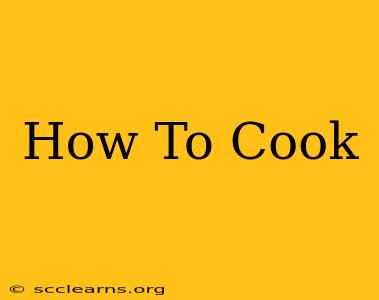So, you want to learn how to cook? Fantastic! Cooking is a rewarding skill that offers incredible benefits, from healthier eating and cost savings to the sheer joy of creating delicious meals. This guide will walk you through the basics, helping you build confidence in the kitchen and embark on your culinary journey.
Essential Kitchen Tools and Equipment
Before you even think about recipes, you need the right tools. You don't need a professional chef's arsenal, but having a few key items will make cooking much easier.
Must-Haves:
- Chef's Knife: A good quality chef's knife is your most important tool. Learn how to use it properly for chopping, dicing, and mincing.
- Cutting Board: Choose a sturdy cutting board, preferably made of wood or plastic.
- Mixing Bowls: A set of mixing bowls in various sizes is essential for prepping ingredients.
- Measuring Cups and Spoons: Accurate measurements are crucial for baking and many recipes.
- Saucepan and Frying Pan: These are your workhorses for cooking most meals.
- Baking Sheet: Essential for roasting vegetables, baking cookies, and more.
Nice-to-Haves:
- Wooden Spoon: Great for stirring and scraping.
- Spatula: For flipping and serving.
- Whisk: For incorporating air into sauces and batters.
Mastering Basic Cooking Techniques
Once you have your equipment, it's time to learn some fundamental cooking techniques.
1. Knife Skills:
Learning proper knife skills is crucial for safety and efficiency. Practice chopping onions, dicing vegetables, and mincing garlic. There are many excellent online tutorials available.
2. Sautéing:
Sautéing involves cooking food quickly in a small amount of hot oil or butter. It's perfect for vegetables, meats, and creating flavorful bases for sauces.
3. Roasting:
Roasting involves cooking food in the oven, often with added herbs and spices. It's a great way to cook vegetables, meats, and poultry.
4. Boiling and Simmering:
Boiling involves bringing a liquid to a rapid boil, while simmering involves keeping it at a gentle, bubbling temperature. Both are crucial for cooking pasta, grains, and stews.
5. Baking:
Baking requires precise measurements and attention to temperature. Start with simple recipes like cookies or muffins to build your skills.
Simple Recipes for Beginners
Don't get overwhelmed! Start with simple recipes that build your confidence.
Easy One-Pan Roasted Chicken and Vegetables:
Toss chicken pieces and chopped vegetables (potatoes, carrots, broccoli) with olive oil, salt, pepper, and herbs. Roast in a preheated oven until the chicken is cooked through.
Quick Pasta with Garlic and Olive Oil:
Cook pasta according to package directions. Sauté minced garlic in olive oil, then toss with the cooked pasta, salt, pepper, and some grated Parmesan cheese.
Simple Scrambled Eggs:
Whisk eggs with a splash of milk or cream, salt, and pepper. Cook in a lightly oiled pan over medium heat, stirring gently until set.
Tips for Success
- Read the entire recipe before you start. This will help you understand the steps and gather all the necessary ingredients.
- Mise en place: Prepare all your ingredients (chop vegetables, measure spices) before you begin cooking. This makes the cooking process much smoother.
- Don't be afraid to experiment. Cooking is a journey of discovery. Try different recipes and flavors to find what you enjoy.
- Taste as you go. Adjust seasoning as needed to achieve the desired flavor.
- Most importantly, have fun! Cooking should be enjoyable.
Learning to cook is a rewarding experience. With practice and patience, you'll become more confident and creative in the kitchen. Start with the basics, build your skills gradually, and enjoy the delicious results!

